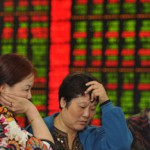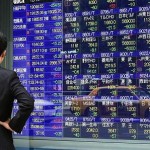Stocks, currencies gauges rebound from worst slump since June; Emerging Markets

-
Stocks, currencies gauges rebound from worst slump since June
-
Ringgit sinks with oil as local markets reopen after holiday
Emerging markets took a breather, with stocks and currencies rebounding from their worst two-day drop since June, as traders pared bets that the Federal Reserve will raise interest rates next week.
MSCI’s gauge of developing-nation shares climbed from a five-week low after Fed Governor Lael Brainard said the case for tightening monetary policy is “less compelling.” Nine of 10 industry groups advanced, led by information technology shares. Equity benchmarks in Thailand, South Korea and Hong Kong led the gains, while those in Malaysia, Indonesia and the Philippines fell as local markets opened after Monday’s holiday. The ringgit declined to its lowest level since June even as a measure of emerging currencies rose.
The market-implied odds of a Fed rate hike on Sept. 21 dropped to 22 percent from 30 percent at the end of last week after Brainard remained dovish in a speech Monday, even as she said the U.S. economy is making gradual progress toward achieving the central bank’s goals. Chinese data supported Tuesday’s rebound, with Asia’s largest economy showing signs of stabilizing after industrial production, retail sales and investment in August exceeded forecasts.
“While the latest remarks from the Fed gave some optimism to emerging-market investors, the risk for an interest rate increase this year remain, and the market will remain volatile and react to the news from central banks,” said Andy Ferdinand, head of equity research at PT Samuel Sekuritas Indonesia in Jakarta. “Data from China was positive, but people would have to really look at it whether it was a solid uptrend or just a positive tick on the downtrend.”
The MSCI Emerging Markets Index rose 0.6 percent to 894.43 as of 12:39 p.m. in Hong Kong, following a 4.1 percent drop over the previous two sessions. The gauge has risen 13 percent this year and trades at 12.3 times the 12-month projected earnings of its constituents. That compares with 3.2 percent gain in the MSCI World Index, which has a multiple of 16.1.
Thailand’s SET Index surged 2 percent, the most since Feb. 19, while the Hang Seng China Enterprises Index of mainland shares traded in Hong Kong advanced 0.5 percent. South Korea’s Kospi also rose 0.5 percent. Samsung Electronics Co. rallied 6.6 percent in Seoul, rebounding from its biggest two-day slump since 2008 on concerns over the recall of its Galaxy Note 7 mobile phone.
Benchmarks in Indonesia, the Philippines and Malaysia dropped at least 0.6 percent each.
Ringgit Slumps
The ringgit slumped 1 percent, its biggest drop since June 24, as a decline in oil prices and a controversy involving a troubled state fund damped demand for Malaysia’s assets. The Philippine peso and Indonesian rupiah fell at least 0.4 percent each, while Thailand’s baht and Taiwan’s dollar rose 0.2 percent. South Korea’s won fell 0.2 percent, after rising as much as 0.6 percent earlier.
The MSCI Emerging Markets Currency Index was up 0.2 percent after sliding 1.3 percent over the previous two days.
Brainard’s comments in a speech in Chicago on Monday were the last before the Fed enters its quiet period during which officials abstain from publicly speaking about monetary policy in the run-up to the Sept. 20-21 meeting of the Federal Open Market Committee.
“There was an initial knee-jerk reaction to the Brainard comments, but the momentum right now is fairly muted because we’re going to be in a holding pattern for the next week,” said Jeffrey Halley, a market strategist at Oanda Asia Pacific Pte in Singapore. “I just don’t think there’s a huge amount of interest to put on aggressive new positioning ahead of the FOMC.”
Source: Bloomberg




























